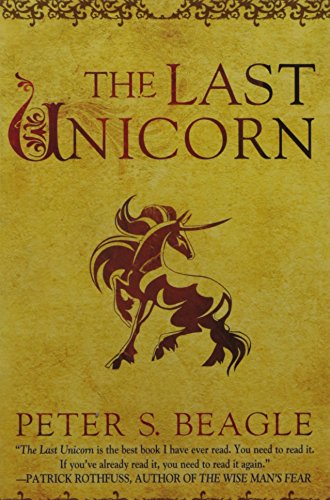 The Last Unicorn by Peter S. Beagle
The Last Unicorn by Peter S. Beagle
 Peter S. Beagle’s classic The Last Unicorn (1968) turns fifty years old this year, and it’s remained in the public eye and continues to capture hearts like very few fantasies of its age. Like a fine tapestry, this gorgeous fairy tale weaves together unicorns and harpies, wizards and witches, dark-hearted kings and brave heroes. Its lyrical language is embellished with whimsical humor and given heft by bittersweet life lessons.
Peter S. Beagle’s classic The Last Unicorn (1968) turns fifty years old this year, and it’s remained in the public eye and continues to capture hearts like very few fantasies of its age. Like a fine tapestry, this gorgeous fairy tale weaves together unicorns and harpies, wizards and witches, dark-hearted kings and brave heroes. Its lyrical language is embellished with whimsical humor and given heft by bittersweet life lessons.
A shy unicorn keeps to herself in her lilac wood, where time passes slowly, if at all, and leaves remain grain and never fall. But one day overhears passing hunters grumbling that they must be in the forest of a unicorn (“Creatures that live in a unicorn’s wood learn a little magic of their own in time, mainly concerned with disappearing”) and that this unicorn must be the last one in the world. Unable to find peace after hearing this, the unicorn leaves her forest to try to find what has become of all the other unicorns, and to rescue them if they need it.
Very few people recognize her for what she is as she travels; mostly they see just a beautiful white mare, and try to capture her for all the wrong reasons. A ditsy butterfly, who speaks mostly in quotes and bits of song, is one of the few that identifies her as a unicorn. The butterfly (in one of his few lucid moments) tells her that her people have been herded away by a Red Bull.
So the unicorn’s quest continues and, despite her preference for solitude, she gathers a few devoted friends around her: Schmendrick, a mediocre (if not downright terrible) magician with infrequent strokes of brilliant magic, enchanted to remain ageless until he can capture and control the magic hidden deep within him. Molly Grue, a woman beaten down by her harsh life, whose heart and wisdom become indispensable to the quest. A spoiled, soft prince who is inspired to become heroic by his love for the unicorn. They have both adventures and trials. And none of them will ever be the same again.
The pages of The Last Unicorn practically turn themselves, as Beagle’s imagination spins one memorable scene after another. There’s the shabby traveling Midnight Carnival of the witch Mommy Fortuna, who disguises ordinary animals to look like magical, mythic ones, but her caged beasts include one actual magical creature, the deadly harpy Celaeno. The unicorn and her friends also pass through the cursed town of Hagsgate, where fruitful fields and financial prosperity are juxtaposed with the bleak hearts and faces of the townspeople, who know the curse will come home to roost at some point.
The Last Unicorn’s pages are also filled with countless similes and metaphors:
“You can’t come with us. We are on a quest.” His voice and eyes were as stern as he could make them, but he could feel his nose being bewildered. He had never been able to discipline his nose.
Molly’s own face closed like a castle against him, trundling out the guns and slings and cauldrons of boiling lead. “And who are you to say ‘we’?””
In the words of Dr. Mardy Grothe, Beagle never metaphor he didn’t like. Occasionally it’s a bit over the top, but overall I found his writing delightful. Less engaging, at least for me, were the songs occasionally sung by the characters. They weren’t particularly inspired or inspiring, and I thought most of them were weaker links in the story. But there are some delicious ironies, such as the prince trying (and failing) to win the heart of the lady he hopelessly loves by bringing her heads of ogres and dead bodies of dangerous beast, in classic conquering hero style. And I was unexpectedly moved to tears by the ending.
The setting is generally medieval, but Beagle throws in a few anachronisms, like the butterfly singing “Won’t you come home, Bill Bailey” and saying “I must take the A train,” and a bored prince reading a magazine while his betrothed princess fruitlessly calls for a unicorn. They’re amusing touches, but they also serve to give the story a timeless feel.

The Last Unicorn is an inspired tale, a well-deserved classic with unforgettable characters and profound themes. The unicorn and her friends have enchanted readers for fifty years. May they continue to do so for many, many more.
~Tadiana Jones
 A lovely story. I was lucky enough to encounter an audio edition narrated by Peter S. Beagle himself. It’s in my Audible library but doesn’t seem to be for sale anymore, at least as I’m writing this in May 2022. I hope it reappears soon.
A lovely story. I was lucky enough to encounter an audio edition narrated by Peter S. Beagle himself. It’s in my Audible library but doesn’t seem to be for sale anymore, at least as I’m writing this in May 2022. I hope it reappears soon.
~Kat Hooper




I remember loving this book and really would like to revisit it. And oh…Schmendrick, (שמענדריק), of course, is Yiddish for an ineffectual, foolish, or contemptible person….
That is fantastic! I should have suspected that his name carried some meaning. Thanks for sharing!
Ah, I love this book, and suspect I’ll love it for the rest of my life. Excellent review, Tadiana. :)
Fifty years! Wow. Now I’m in the mood to re-read!!